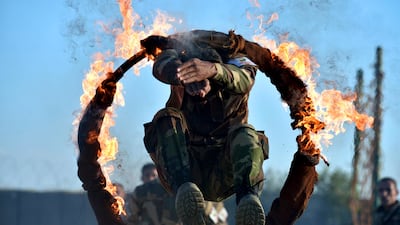Turkey has assured its armed allies in Syria that a possible easing of hostilities with Damascus will not result in their disbanding or handing over of rebel areas to the regime, sources within the Syrian opposition to President Bashar Al Assad said on Thursday, after unrest in Ankara's zone of influence in the country.
At least seven people were killed this week when violence broke out targeting Turkish interests in its area of influence in Syria over signs of a rapprochement between Ankara and Damascus. The attacks were also in reaction to new waves of violence against Syrian refugees in Turkey.
Turkey's sphere of influence in Syria, comprising areas in the north-west border provinces of Aleppo and Idlib, is vital for Ankara's aim to pledge itself as a key external player in the 13-year civil war. The Turkish-aligned militias in these areas are instrumental in countering perceived threats to Turkey's security, particularly by secular Kurdish militias supported by the United States.
"I got the impression that the Turks will give Assad nothing substantial," a senior opposition member who met with Turkish officials in Istanbul on Thursday told The National.
Turkey told its allies in the north-west that they will continue to receive Turkish support, even if Ankara makes steps to restore ties with Damascus, the opposition member said.
"Ankara's policy continues to be to have channels with everyone," he added.
The violence this week, however, has undermined Turkey's image as a force for potential stabilisation in Syria and as a protector of the Sunni majority - who dealt the brunt of the violence throughout the civil war.
The war started in the second half of 2011, after security forces suppressed a peaceful revolt against President Assad.
But this time, the unrest was directed towards Turkey, after Ankara had instructed its Syrian allies to open a formal crossing for goods between the Turkish zone of control in Syria and areas under Syrian government control, the opposition sources said.

A number of Turkish lorries that were heading to the crossing were attacked and set on fire on Monday, residents said.
Another opposition member who attended a separate meeting with Turkish officials in Istanbul on Thursday told The National that Russia - and to a lesser degree Iran - have been lobbying Ankara to open the crossing. Both Moscow and Tehran have been staunch supporters of President Assad.
Russia and Turkey came close to direct escalation over north-west Syria before a deal in March 2020 curbed the confrontation between the two powers.
"The Turkish reasoning is that there is massive smuggling between the regime and opposition areas anyway, and that Turkey has not ceded anything really by opening the crossing," he said.
The authorities in Ankara, he said, regard any restoration of commercial exchange with Damascus "separate to the political and military files".
Turkish forces are stationed in the areas of north-west Syria, outside Syrian government control. The region is mainly divided into areas controlled by Hayat Tahrir Al Sham (HTS), an Al Qaeda offshoot with channels with Turkey, and the Syrian National Army, a Turkish proxy set up in 2018.
Members of HTS participated in the attacks on Turkish targets this week, residents and other sources said.
A military source in the opposition said that the group has made it clear to Turkey that it "will not tolerate being played with".
"The Turks' relationship with the HTS is a major plank of their power in Syria, and they cannot afford to lose it," the source said.
In a statement, the group denied taking part in the violence in the north-west this week.
Serhat Erkmen, Director of the Ankara-based Pros&Cons Security and Risk Assessment Center, said Turkey will not change its position in the short run.
"In the long run, the future of these regions will be determined by the regional dynamics and Turkey's relations with Russia," he told The National.

